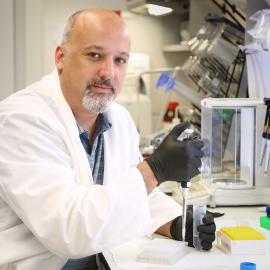
Raymond J. Langley, Ph.D.
Biography
Dr. Raymond J. Langley, Associate Professor, received his Baccalaureate of Arts in Journalism and Biology and his Ph.D. in Biomedical Sciences at the University of New Mexico. Dr. Langley brings to USA his research experiences from the National Center for Genome Resources in Santa Fe, NM, and from Lovelace Respiratory Research Institute in Albuquerque, NM.
Research
My lab has focused on understanding mechanisms of acute and chronic patients’ outcomes due to sepsis, acute respiratory distress syndrome (ARDS), and critical illness. Our work has centered around utilizing systems biology approaches to identify novel mechanisms of disease in both clinical patient samples, as well as appropriate animal models. We have been on the forefront of utilizing cutting edge metabolomics and Next Generation Sequencing technologies, along with novel bioinformatics approaches to determine the effects on bioenergetic pathways.
Our lab has been interested particularly on the emerging evidence that a bioenergetics crisis due to mitochondrial dysfunction is a major driving factor of mortality in sepsis and ARDS. A complimentary line is related to the hypothesis that oxidative stress in critical illness leads to depletion of nicotinamide adenine dinucleotide (NAD) pool into nonrecyclable pyridones. Because loss of NAD+/NADH negatively affects energy production as well as cellular reduction and oxidation (REDOX) capacity, we propose that repletion of NAD through the aerosolized delivery of Vitamin B3 in an appropriate bioavailable form may improve patient outcomes. Lastly, we propose that long-term physical function in survivors of critical illness is also affected by decreased NAD+/NADH.
Publications
Chouchane O, Schuurman AR, Reijnders TDY, Peters-Sengers H, Butler JM, Uhel F, Schultz MJ, Bonten MJ, Cremer OL, Calfee CS, Matthay MA, Langley RJ, Alipanah-Lechner N, Kingsmore SF, Rogers A, van Weeghel M, Vaz FM, van der Poll T. The plasma lipidomic landscape in patients with sepsis due to community-acquired pneumonia. Am J Respir Crit Care Med. 2024. Accepted.
Buckley CT, Lee YL, Schuler A, Langley RJ, Kutcher ME, Barrington R, Audia JP, Simmons JD. Deleterious effects of plasma-derived cellular debris in a porcine model of hemorrhagic shock. Injury. 2023. doi: 10.1016/j.injury.2023.111300. Online ahead of print.
Daly GT, Pastukh VM, Tan YB, Francis CM, Aggen CZ, Groark SC, Edwards C, Mulekar MS, Hamo M, Simmons JD, Kutcher ME, Hartsell EM, Dinwiddie DL, Turpin ZM, Bass HW, Roberts JT, Gillespie MN, Langley RJ. Novel attributes of cell-free plasma mitochondrial DNA in traumatic injury. Clin Transl Med. 2022 Oct;12(10):e1055. doi: 10.1002/ctm2.1055. PMID: 36245326; PMCID: PMC9574491.
Hartsell EM, Gillespie MN, Langley RJ. Does acute and persistent metabolic dysregulation in COVID-19 point to novel biomarkers and future therapeutic strategies? Eur Respir J. 2022 Feb;59(2). doi: 10.1183/13993003.02417-2021. Print 2022 Feb. PMID: 34675049; PMCID: PMC8542864.
Tsalik EL, Henao R, Montgomery JL, Nawrocki JW, Aydin M, Lydon EC, Ko ER, Petzold E, Nicholson BP, Cairns CB, Glickman SW, Quackenbush E, Kingsmore SF, Jaehne AK, Rivers EP, Langley RJ, Fowler VG, McClain MT, Crisp RJ, Ginsburg GS, Burke TW, Hemmert AC, Woods CW. Discriminating Bacterial and Viral Infection Using a Rapid Host Gene Expression Test. Crit Care Med. 2021 Oct 1;49(10):1651-1663. doi: 10.1097/CCM.0000000000005085. PMID: 33938716; PMCID: PMC8448917.
Langley RJ, Migaud ME, Flores L, Thompson JW, Kean EA, Mostellar MM, Mowry M, Luckett P, Purcell LD, Lovato J, Gandotra S, Benton R, Files DC, Harrod KS, Gillespie MN, Morris PE. A metabolomic endotype of bioenergetic dysfunction predicts mortality in critically ill patients with acute respiratory failure. Sci Rep. 2021 May 18;11(1):10515. doi: 10.1038/s41598-021-89716-0. PMID: 34006901; PMCID: PMC8131588.
